A church-run business incubator grows its community’s own solutions to poverty
By now, no concept or idea is too off-the-wall for the Rev. Barry Randolph and his congregation at Church of the Messiah in Detroit.
More than 200 affordable housing units run by the church? Check. Free internet for residents who didn’t have access? Done. A growing list of incubated businesses with products ranging from tea to deodorant to a clothing line? No problem.
This innovative Episcopal church anchors the Islandview neighborhood on Detroit’s east side. In a city with an estimated poverty rate of 36%, more than three times the national average, Randolph is driven by a desire to foster an equitable community whose residents have a stake in its success.
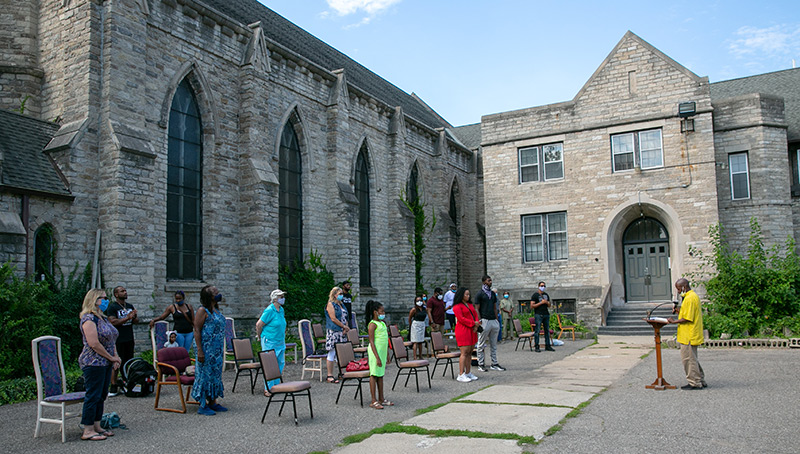
“You can’t throw money at it. It’s not about just getting somebody a job. Now you have to teach people how to keep the job,” said 57-year-old Randolph. “And it’s not about just bringing people up. Sometimes you gotta bring up the whole community.”
What challenges does your congregation face that cannot be solved with money?
This approach helped Randolph transform the church, once on the verge of shuttering, to a community hub that’s now more than 300 members strong, racially diverse and majority young.
Randolph and his parishioners see the church as an incubation center. At the church, someone with a business idea can team up with accountants and attorneys to get it off the ground, and many have.
“You need your phone charged? Here’s a charging station,” said Bishop Bonnie Perry of the Episcopal Diocese of Michigan, referring to Church of the Messiah’s four solar-powered community charging stations. “The entrepreneurial spirit, that kind of spirit, is what our church longs for.”

2020 Traditioned Innovation Award Winner
Leadership Education at Duke Divinity recognizes institutions that act creatively in the face of challenges while remaining faithful to their mission and convictions. Winners received $10,000 to continue their work.
People returning home from prison can seek help getting a job from the church’s employment office. The church is also the home base for a marching band that secures college scholarships for teens who once thought they wouldn’t graduate from high school.
To Randolph, it all ties back to providing people a path out of poverty.
A relatable approach
Ask members at Church of the Messiah their impressions of Randolph and his leadership and they’ll likely say he’s the “realest” pastor they know.
Before he became a priest, Randolph was a businessman. He co-owned a distribution company, dabbled in catering and managed the deli at a local market for a decade.
He doesn’t write down his sermons. He doesn’t preach from the pulpit, because he doesn’t like to be elevated above his congregation.
He dresses casually, wearing a short-sleeved button-up and khakis during a recent outdoor service.
His congregation calls him Pastor Barry, not Father.

Of the Episcopal Diocese of Michigan’s 90 active priests and deacons, he’s one of six Black clergypeople.
Bucking the trend of the majority-white denomination, 60% of Church of the Messiah’s members are Black men under 30. Randolph says 70% of his congregation is under age 35.
“It was kind of different for me seeing people exactly like me, the exact same mentality,” said 22-year-old Samijai Blanks, a Black man who has been involved with the church since he was a boy. “A lot of people my age wouldn’t even think about church.”
Randolph lives at the church and doesn’t take a salary. He has a large family — 11 brothers and sisters, and 31 adult nieces and nephews — who pitch in to support him financially. His relatives pay for his groceries and help with transportation, because he doesn’t own a car.
Foundation funding, philanthropic donations, and a mix of spiritual and secular collaboration sustain the church’s ministries. Over the years, the Ford Foundation, the Kresge Foundation and others have financed efforts such as the business incubation program and the employment office.
“We never do anything based on money. We do it, and then the money seems to follow,” Randolph said. “People see the work, and then they come in and they help us to be able to build.”
What could your church do if you pursued an idea first and trusted that the money would follow?
Church of the Messiah’s work in the community has drawn interest from as far as Latvia and Uganda. The church is spearheading what it calls The Master’s Plan, a coalition of 103 religious organizations seeking to rebuild communities and lift people out of poverty by drawing on the talents of their congregations. Randolph is leading churches in doing an asset assessment to identify members who work in the medical field, skilled trades, education and other professions to “help build the kingdom.”
“We’re trying to use other churches to be able to do it in their community and neighborhood with no excuses,” he said. “It’s worked for us.”
The hardest aspect of this type of community building is for churches to shift their mindset from focusing on what people are missing to realizing what they have, said the Rev. Michael Mather, the pastor of First United Methodist Church of Boulder, Colorado, and a faculty member at the Asset-Based Community Development Institute at DePaul University.
What would it take to shift your church’s focus from what’s missing to what assets are present?
Mather is a former pastor of Broadway United Methodist Church in Indianapolis, where he revamped the church’s approach to ministry by asking people what their gifts were and looking for opportunities around those talents.
“One of the rules that we followed and that we’ve tried to think about a lot was that money should always flow into the hands of the people who don’t have much,” Mather said. “In the past, what we’ve done is we would pay ourselves to run programs for people whose problem was they didn’t have money. But we didn’t see the irrationality of it when we were doing it.”
Making the word of God tangible
Randolph first came to Church of the Messiah in 1991. He attended a service to hear his mother, a member, speak about faith.
He hadn’t been to church in two years. Raised a Baptist, he’d always believed in God. “I just couldn’t stand organized religion,” he said.
He found the Episcopal service ritualistic and dry. He hated the chanting. The hymns reminded him of a funeral march. Bored by it all, he swore he’d never return.
But the church was looking for someone to tutor kids in reading, and Randolph agreed to it. The church’s commitment to the community, demonstrated through efforts like the Church of the Messiah Housing Corporation founded in 1978, and his respect for the people behind those efforts, including then-rector the Rev. Canon Ronald Spann, eased his skepticism. Randolph eventually became a member.
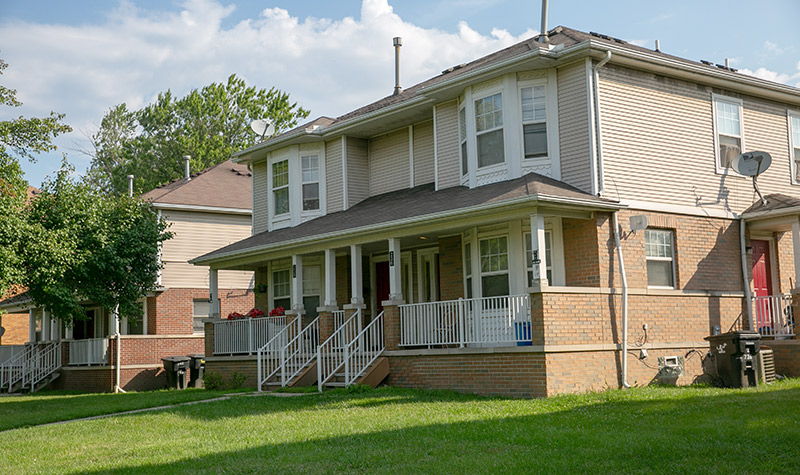
His relationship with the church deepened thanks to his love for working with kids. He became the Sunday school teacher, then the youth director, then the worship leader.
Randolph moved to the Islandview neighborhood in 1997 to be close to Church of the Messiah. He grew up six blocks away, but unlike Islandview, his childhood neighborhood had no concentrated poverty. When he moved there as an adult, he realized that while his upbringing had been more privileged, he felt more at home in tightknit Islandview. The residents were the jewels of the community — they just needed opportunity.
Becoming an Episcopal priest wasn’t in Randolph’s plans. But in 1998, God spoke to him and called him to bring more young people to Church of the Messiah as a priest.
The church’s numbers had plummeted to 40 members by the time Randolph became ordained in 2002. The situation only worsened over the following years. With Church of the Messiah in debt and the building in disrepair, Randolph knew he needed to do something different.
“Church of the Messiah was always a community church in the sense that people knew that we did housing or summer camps or after-school programs,” he said. “What they didn’t get was how we worshipped. They didn’t come to worship. They came to everything else.”
The traditional service didn’t resonate with the community, so Randolph redesigned it. He added a noon service to attract young parishioners. Mindful that some people might be illiterate, he got rid of the collective readings. The outline of the Episcopal service remained, but this new version was wrapped in a package that was accessible to first-time churchgoers.
“He attracted all these young people,” said Kenyon Reese, 48, who has been a member nearly all his life. Reese recalls the service dwindling to just eight or nine people before Randolph switched it up. “He just changed the energy,” he said.
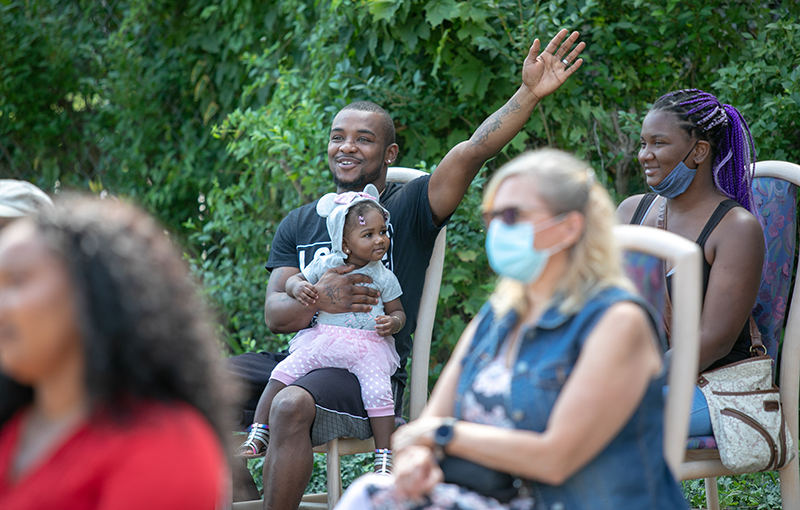
Randolph geared the service toward bringing out parishioners’ greatness, with the church acting as the incubation center to help people realize their goals. Through the doors came formerly incarcerated people, former gang members and individuals who’d dropped out of school. These new parishioners wanted to know how to tap into the greatness Randolph preached about. What did greatness mean for them when they couldn’t find a job? Randolph directed them to the church’s employment office and entrepreneurship mentoring.
How might you make your church and its offerings more accessible to more people?
“We were putting things in place to where we were making the word of God tangible, regardless of your background,” Randolph said.
Word traveled in the neighborhood and beyond. The buzz attracted professionals, doctors and attorneys curious about the church’s growing reputation as a business incubator, an employer and a housing provider. The church’s membership grew to 100 people within six months, Randolph said. Then to 200 the next year. Within three years, Church of the Messiah was home to 300 members.
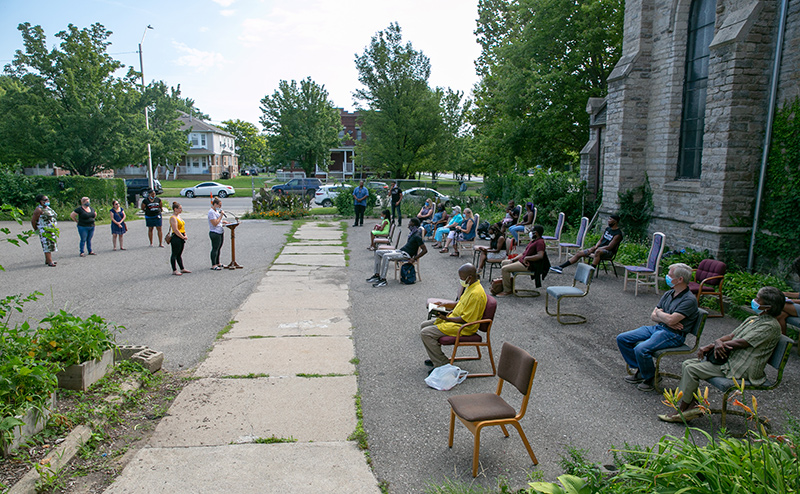
Investing in second chances
Some arrive at the church out of necessity and come to view it as a community center and a home.
That was 26-year-old Dwight Roston’s path.
At 16, Roston said, he was getting into trouble — skipping school, fighting and stealing cars — a product of being young and bored and unable to find a job. He showed up at Church of the Messiah to do community service as a condition of his probation. He wasn’t looking for guidance, but Randolph quickly noticed that Roston was artistically inclined.
How can you train your parishioners to notice and affirm the gifts of others?
Randolph asked him: Why was he stealing cars if he was this good at drawing?
So Roston stuck around. At the church, he learned to use a screen press to make and sell his own T-shirts. He recorded music. He worked for Nikki’s Ginger Tea, the longest-running business incubated by the church, which showed him the ins and outs of wholesale and retail. He learned to install free internet in the neighborhood through the church’s participation in the Equitable Internet Initiative. He learned video production, worked on a project with PBS and started his own company, I Am Productions.
The church service is only an hour on Sundays, but Roston finds himself at the church every day.
“It has all these different programs, and you can’t find that anywhere else,” he said. “They don’t care about what kind of past you have or anything like that. Are you willing to be a productive person? Everybody has something to bring to the table, like a bunch of puzzle pieces.”
Kimberly Woodson, 50, credits Randolph with helping her find a job and launch her own nonprofit after she served 29 years in prison for a murder conviction as a juvenile.
Woodson was pregnant and looking for housing when someone brought her to Church of the Messiah a few years ago. She shared her story with Randolph and later became a member.
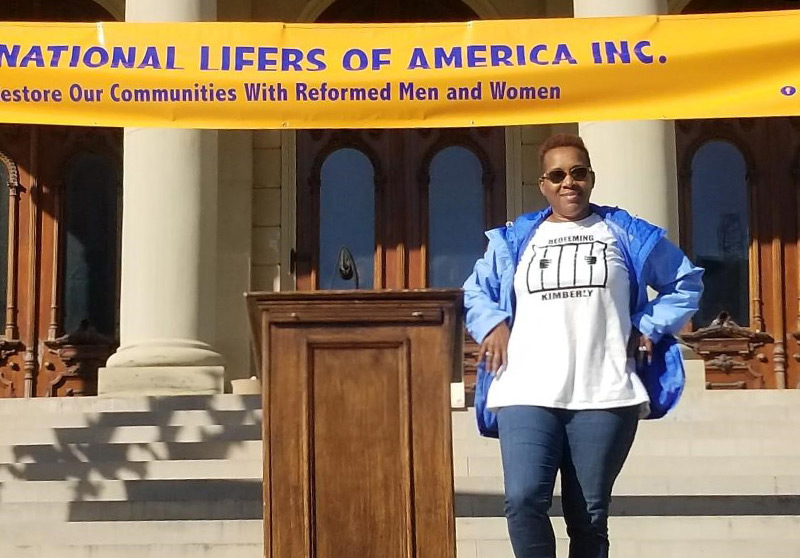
Woodson told Randolph that she wanted to help others reenter society after incarceration. He introduced her to a woman who works in prison ministry and could walk Woodson through the process of starting a nonprofit. She helped Woodson fill out paperwork for articles of incorporation and apply for an employer identification number, steps that Woodson said would have been overwhelming without guidance.
The ministry of introduction can be a simple act with profound repercussions. Is there someone you know who needs to be introduced to someone else?
Now Woodson’s organization, Redeeming Kimberly, has been operating for a year and hosts events such as clothing drives and resource fairs at the church.
Randolph could help the community by simply giving away food and clothing, Woodson said, but instead, he chooses to invest in people and their ideas.
“He don’t just give you a fish. He’ll give you a fish and a fishing rod, tell you how to get to the water, the best methods to make the bait and how to catch the fish,” she said.
Randolph believes that people have been blessed with talents from God. And at Church of the Messiah, he invites them to grow those gifts.
“We’re created in the image of God,” he said. “So we need to bring it into fruition. We don’t want to waste that gift or talent.”
Questions to consider
Questions to consider
- The Rev. Barry Randolph says that you can’t just throw money at a community in poverty to improve it. What challenges does your congregation face that cannot be solved with money?
- Randolph’s funding has largely come after he’s pursued ideas. What could your church do if you pursued an idea first and trusted that the money would follow?
- Changing from a scarcity mindset is difficult. What would it take to shift your church’s focus from what’s missing to what assets are present?
- Randolph redesigned the service to allow the community to engage. How might you make your church and its offerings more accessible to more people?
- Randolph saw how talented a parishioner was and encouraged that talent. How can you train your parishioners to notice and affirm the gifts of others?
- The ministry of introduction can be a simple act with profound repercussions. Is there someone you know who needs to be introduced to someone else?